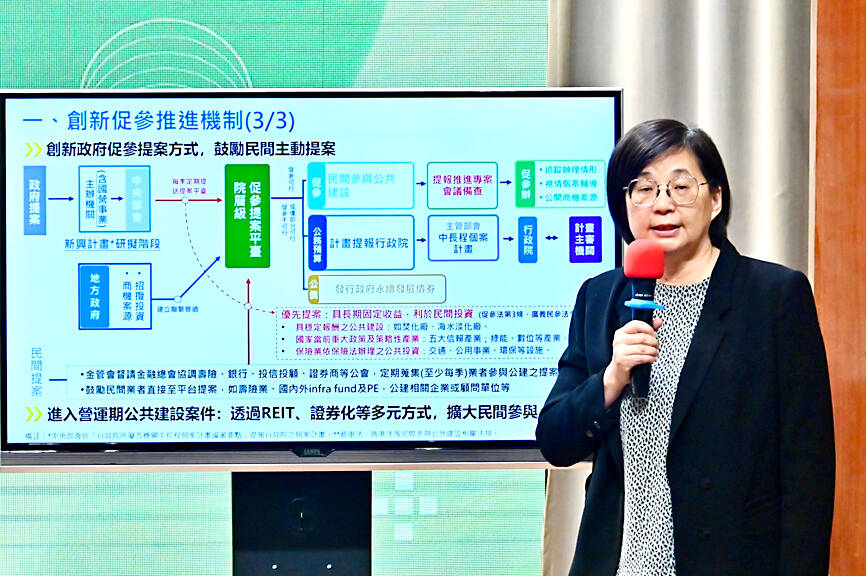The National Development Council (NDC) yesterday unveiled three major strategies to promote the government’s Trillion NT Dollar Investment National Development Plan, aiming to encourage private funds to invest in public infrastructure projects, including airports and mass rapid transport systems.
The plan was introduced by the Executive Yuan’s Economic Development Committee earlier this week, highlighting the government’s commitment to injecting momentum into the country’s economy while addressing regional development imbalances.
To achieve the goal, the NDC would establish a mechanism to promote the private sector’s innovative participation in infrastructure projects, then optimize investment and financing conditions for public construction and increase financial products related to public construction projects, it said in a report submitted to the Executive Yuan.

Photo courtesy of Executive Yuan
Regarding the mechanism for promoting innovative participation in public infrastructure, the council said it would set up a special task force to allow the government and the private sector to jointly propose infrastructure projects.
The task force would facilitate cross-ministry coordination and communication; take feedback from representatives of the private sector, experts and academics; and promote deregulation, it said.
As for optimizing investment and financing conditions for public construction projects, the council said that the risk coefficient applicable to insurance firms that have direct investments in public infrastructure through domestic private equity funds and venture capital firms would be lowered to 1.28 percent from 10.18 percent, it said.
That means insurance companies would only need about one-10th of the capital currently required for public infrastructure investments, a change that is expected to encourage insurers to allocate more capital to the local market rather than to foreign assets, the NDC said.
The council would also review strategic industry cases with public construction elements to ease investment limits on the insurance industry, increase financing guarantees from the government and improve the efficiency of capital utilization, it added.
In terms of increasing financial products related to public construction, the government aims to promote real-estate investment trusts, expand the issuance of sustainable development bonds and push public construction securitization, the council said, adding that it would help the government reduce public construction financing costs while providing high-quality financial products for private investors.
Several potential projects are applicable to the issuance of sustainable development bonds, including planned expansion of the Kaohsiung MRT’s Orange Line, Kaohsiung International Airport’s new terminal project, a Taoyuan MRT project and social housing projects run by the Ministry of the Interior, the council said, adding that it expects NT$510 billion to NT$610 billion (USS$15.7 billion to US$18.8 billion) of sustainable development bonds would be issued for public infrastructure, with a yield of 1.26 to 1.27 percent.
The national investment plan would be jointly promoted by the council, the Ministry of Finance and other ministries, as well as the Financial Supervisory Commission, it said.
It is projected to attract NT$682.9 billion from the private sector to participate in public infrastructure from next year to 2028 and create 126,000 jobs, the council said.

A Ministry of Foreign Affairs official yesterday said that a delegation that visited China for an APEC meeting did not receive any kind of treatment that downgraded Taiwan’s sovereignty. Department of International Organizations Director-General Jonathan Sun (孫儉元) said that he and a group of ministry officials visited Shenzhen, China, to attend the APEC Informal Senior Officials’ Meeting last month. The trip went “smoothly and safely” for all Taiwanese delegates, as the Chinese side arranged the trip in accordance with long-standing practices, Sun said at the ministry’s weekly briefing. The Taiwanese group did not encounter any political suppression, he said. Sun made the remarks when

The Taiwanese passport ranked 33rd in a global listing of passports by convenience this month, rising three places from last month’s ranking, but matching its position in January last year. The Henley Passport Index, an international ranking of passports by the number of designations its holder can travel to without a visa, showed that the Taiwan passport enables holders to travel to 139 countries and territories without a visa. Singapore’s passport was ranked the most powerful with visa-free access to 192 destinations out of 227, according to the index published on Tuesday by UK-based migration investment consultancy firm Henley and Partners. Japan’s and

BROAD AGREEMENT: The two are nearing a trade deal to reduce Taiwan’s tariff to 15% and a commitment for TSMC to build five more fabs, a ‘New York Times’ report said Taiwan and the US have reached a broad consensus on a trade deal, the Executive Yuan’s Office of Trade Negotiations said yesterday, after a report said that Washington is set to reduce Taiwan’s tariff rate to 15 percent. The New York Times on Monday reported that the two nations are nearing a trade deal to reduce Taiwan’s tariff rate to 15 percent and commit Taiwan Semiconductor Manufacturing Co (TSMC, 台積電) to building at least five more facilities in the US. “The agreement, which has been under negotiation for months, is being legally scrubbed and could be announced this month,” the paper said,

NATIONAL SECURITY THREAT: An official said that Guan Guan’s comments had gone beyond the threshold of free speech, as she advocated for the destruction of the ROC China-born media influencer Guan Guan’s (關關) residency permit has been revoked for repeatedly posting pro-China content that threatens national security, the National Immigration Agency said yesterday. Guan Guan has said many controversial things in her videos posted to Douyin (抖音), including “the red flag will soon be painted all over Taiwan” and “Taiwan is an inseparable part of China,” while expressing hope for expedited “reunification.” The agency received multiple reports alleging that Guan Guan had advocated for armed reunification last year. After investigating, the agency last month issued a notice requiring her to appear and account for her actions. Guan Guan appeared as required,